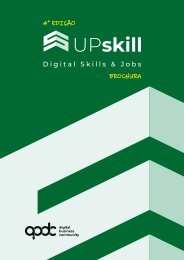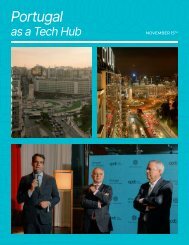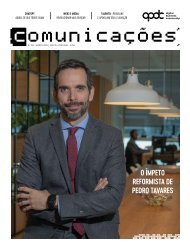NEARSHORE PORTUGAL - TRENDS ON TALENT MANAGEMENT - 3rd Edition
Aon's partnership with APDC and Experis resulted in the 3rd edition of the study "Nearshore Portugal: Trends in Talent Management". The initiative involved 45 companies, which employ a workforce of around 65,000, and aimed to find out the new challenges of human resource management in the sector, which has seen significant development in recent years.
Aon's partnership with APDC and Experis resulted in the 3rd edition of the study "Nearshore Portugal: Trends in Talent Management". The initiative involved 45 companies, which employ a workforce of around 65,000, and aimed to find out the new challenges of human resource management in the sector, which has seen significant development in recent years.
You also want an ePaper? Increase the reach of your titles
YUMPU automatically turns print PDFs into web optimized ePapers that Google loves.
<strong>NEARSHORE</strong> <strong>PORTUGAL</strong><br />
Trends on talent management<br />
3 rd <strong>Edition</strong>
Index<br />
1. Introduction<br />
2. Engaged Companies<br />
<strong>NEARSHORE</strong> <strong>PORTUGAL</strong> - Tendências na gestão de talento<br />
3. Study framework<br />
4. EMEA Context<br />
5. PT context (survey results)<br />
6. Evolution of the main indicators when compared to the 2nd edition<br />
7. What’s next?<br />
2
1Introduction
Introduction<br />
It is with great enthusiasm that we launch the Nearshore Benefits and Trends<br />
study - 3 rd edition, a joint project between Aon and APDC.<br />
<strong>NEARSHORE</strong> <strong>PORTUGAL</strong> - Tendências na gestão de talento<br />
The study was carried out From October 17 to November 21, 2022, aiming to<br />
identify the main challenges faced by human resources management, as well<br />
as provide a better understanding on how organizations are thinking about<br />
the future: which kind of strategy is being planning? This study involved 45<br />
companies, which represent a universe of approximately 65,000 employees.<br />
This edition seeks to extend the analysis in 4 dimensions:<br />
1. Workforce: profile of the current workforce and profile considered for<br />
recruitment purpose<br />
2. New work models and future challenges<br />
3. Rewards: compensation and benefits<br />
4. Wellbeing: wellness and resilience strategies<br />
We invite you to discover the study main insights, as well as getting to know in<br />
detail the context that stimulated the Nearshore sector growth in recent years.<br />
4
2Engaged<br />
Companies
Engaged Companies<br />
45 companies participated in the 2022 Nearshore Benefits and Trends<br />
study, among which we would like to highlight:<br />
<strong>NEARSHORE</strong> <strong>PORTUGAL</strong> - Tendências na gestão de talento<br />
• atsistemas<br />
• Capgemini<br />
• CGI<br />
• Cisco<br />
• Claranet/ Ignit People<br />
• Data Magnum<br />
• DXC<br />
• Inetum<br />
• Inodev<br />
• Irium<br />
• LBC<br />
• Softinsa<br />
We are grateful for the important contribution of all the companies<br />
to this study. The Nearshore sector in Portugal has seen significant<br />
development in recent years, which is the main reason to keep<br />
interested and develop this study, counting on most relevant insights<br />
shared by the participating companies.<br />
6
3<br />
Study<br />
Framework
Study Framework<br />
Nearshore sector in Portugal has seen significant development<br />
in recent years.<br />
Demography<br />
Talent<br />
<strong>NEARSHORE</strong> <strong>PORTUGAL</strong> - Tendências na gestão de talento<br />
According to a recent study by the international real estate<br />
group Savills, Portugal has managed to attract more and more<br />
interest from foreign investors, who hope to establish their<br />
businesses in a shared services center/Nearshore here.<br />
By 2021, Portuguese Agency for Commerce and Investment<br />
(AICEP) indicated that 175 BSC's/Nearshore companies were<br />
currently operating in Portugal, most of them based in Lisbon<br />
(111) and Porto (56). In addition to the two big regions, other<br />
cities such as Braga (9) and Aveiro (5) have also managed to<br />
attract some interest from this business.<br />
Among the reasons for the increasing number of Service<br />
Centers/Nearshore established referred in that report are<br />
the recognition of Portuguese workforce skills, the quality of<br />
educational institutions (universities), the peaceful political<br />
climate, as well as the growing investment in digital services.<br />
(AICEP, 2022).<br />
Population<br />
10.344.802<br />
(censos 2021)<br />
GDP Growth<br />
4.9%<br />
(censos 2021)<br />
Unemployment rate<br />
6.3%<br />
(censos 2021)<br />
Inflation<br />
2.8%<br />
Students in Higher<br />
Education<br />
411.995<br />
(2020 | 2021)<br />
Graduates<br />
87.733<br />
(2019 | 2020)<br />
STEM Areas<br />
23%<br />
Foreign<br />
Students<br />
Aprox. 55.000<br />
(dezembro 2021)<br />
(2020 | 2021)<br />
8<br />
Fonte: AICEP, 2021<br />
Universities<br />
288<br />
(2021)
Study Framework<br />
<strong>NEARSHORE</strong> <strong>PORTUGAL</strong> - Tendências na gestão de talento<br />
The main activities represented among this sector are:<br />
• Shared Service Center / Global Business Service Center<br />
• IT Service Center<br />
• Competence Center<br />
• Business Process Outsourcing Center<br />
Portugal is today a preferred location for several multinational<br />
companies to establish Service Centers. There are several successful<br />
case studies that attract the attention of other companies in the<br />
process of choosing a location for their operations.<br />
The most important factor when choosing Portugal is the qualified<br />
workforce talent available at competitive costs. According to many<br />
companies, cost is, among others, an important criterion when<br />
evaluating locations for a service center. Combined with other aspects,<br />
the availability of highly qualified people from reputable universities<br />
with good language skills are key factors making Portugal a top<br />
performer when comparing different locations. Geographical location<br />
- bridging Europe and the US - and a convenient time zone compatible<br />
with regions on both sides of the Atlantic are also important for<br />
multinationals with global operations. A peaceful country, with a<br />
pleasant climate and good quality of life, also attracts foreign talent —<br />
an important aspect for recruitment processes — and this also gives<br />
value to Portugal's attractiveness.<br />
Good infrastructures, namely on which regards to communication<br />
services, were identified as an important aspect once it is particularly<br />
relevant for centers with large activity and people working from<br />
different locations. Portuguese people hospitality towards foreigners,<br />
combined with their commitment to provide quality services, was also<br />
referred as a decisive factor.<br />
9
Study Framework<br />
<strong>NEARSHORE</strong> <strong>PORTUGAL</strong> - Tendências na gestão de talento<br />
10<br />
A growing entrepreneur culture contributing to several<br />
technological startups and unicorns emerging in the<br />
country also created a favorable environment for new<br />
centers set-up, as it was also mentioned by some of the<br />
companies participating in the study.<br />
Number of<br />
companies<br />
200<br />
Number of sites<br />
234<br />
% of foreign<br />
companies<br />
95.3%<br />
Average size<br />
(number of employees)<br />
325<br />
Number of FTEs<br />
(full time equivalent)<br />
72.000<br />
What were the main reasons to choose Portugal as a location for a Service Centre?<br />
1<br />
2<br />
3<br />
4<br />
5<br />
6<br />
7<br />
8<br />
9<br />
10<br />
11<br />
Source: Business Service Centre Survey, n=64<br />
Competitive Costs<br />
Easy to find qualified local talent<br />
Easy to find talent with language skills<br />
Geographic location<br />
Easy to attract foreign talent<br />
Easy to start operations<br />
Plant facilities operating in Portugal<br />
Flight connections<br />
Quality of telecommunications<br />
Presence of multiple SSCs in the country<br />
Headquarters are located in Portugal<br />
Companies with service centers in Portugal by sector:<br />
5%<br />
33%<br />
27%<br />
27%<br />
22%<br />
22%<br />
16%<br />
12%<br />
6%<br />
4%<br />
3%<br />
6%<br />
7%<br />
7%<br />
4%<br />
6%<br />
3%<br />
5%<br />
70%<br />
67%<br />
45%<br />
Respondents were asked to choose 3 or more reasons and rank them (1 being the most important). The graph shows the percentage of respondents that picked the reason<br />
Source: Business Service Centre Survey, n=81<br />
Information Technology (Hardware, Software, IT Services)<br />
Manufacturing<br />
Transport equipment<br />
Chemical Products<br />
Food products, beverages and tobacco products<br />
Pharmaceuticals, medicinal and botanical products<br />
Others<br />
Other Professional, Scientific and Technical Services<br />
Telecommunication services<br />
Transportation<br />
Banking and Insurance<br />
Healthcare services<br />
Others<br />
88%<br />
33%<br />
31%
Study Framework<br />
<strong>NEARSHORE</strong> <strong>PORTUGAL</strong> - Tendências na gestão de talento<br />
Strategies and challenges regarding Talent attracting and<br />
retaining<br />
Before the pandemic, talent retention was already the main<br />
challenge for the sector and remains as part of top concerns<br />
for managers and recruiters. This challenge is most<br />
noticeable in IT areas. Among the top 3 concerns are:<br />
• Salaries increase and benefits competitiveness<br />
• For 67% of the companies, hiring people with technical<br />
qualifications is also a challenge<br />
• “Office space” lose relevance as the prevalence of remote<br />
work increases<br />
What are the main factors for the success of your Service Centers in Portugal?<br />
1<br />
2<br />
3<br />
4<br />
5<br />
6<br />
7<br />
8<br />
Talent quality<br />
Performance<br />
Flexibility / Versatility<br />
Competitive costs<br />
Employee motivation and dedication<br />
Language skills<br />
The Portuguese culture<br />
Others<br />
26%<br />
23%<br />
18%<br />
18%<br />
13%<br />
10%<br />
Source: AICEP/IDC Portugal – Business Service Centres in Portugal 2022<br />
38%<br />
51%<br />
11
4EMEA Context
Emea Context<br />
2021 Top<br />
1 2<br />
<strong>NEARSHORE</strong> <strong>PORTUGAL</strong> - Tendências na gestão de talento<br />
The technology industries sector has been shaping<br />
itself in line with some recent trends, such as the<br />
transition of some companies from the private domain<br />
to the public domain, the growing M&A operations<br />
that exponentially accelerate the growth of some<br />
companies in the sector, the impact of robotics and<br />
artificial intelligence, the increasing threat associated<br />
with cybersecurity and the (increasingly) challenging<br />
and complex regulatory models in the sector.<br />
According to Aon's 2021 Global Risk Management<br />
Survey, were identified as key risks for the Europe<br />
region:<br />
1. Cyber attacks<br />
2. Business interruption<br />
3. Technological and system failures<br />
4. Inability to attract and retain talent<br />
5. Data Protection (including GDPR)/Requirements and<br />
Non-Compliance<br />
6. Increased competition<br />
Added to this is the need to find a balance between<br />
the pace of innovation and the capacity for growth of<br />
the organizations themselves, while the complexity of<br />
the solutions needed for the future requires companies<br />
to find new profiles of talent and expertise.<br />
In such a dynamic and constantly evolving<br />
context, what are the topics that most<br />
concern companies?<br />
Overall, assessing how these risks may evolve over<br />
the next 3 years, it is observed that there are three<br />
parameters that will gain importance in the ranking,<br />
namely Increased competition (moves from position<br />
6 to position 3), Disability of attracting and retaining<br />
talent (rises from position 4 to position 2) and Damage<br />
to reputation/brand (changes from position 10 to<br />
position 5).<br />
Cyber Attacks/<br />
Data Breach<br />
3 4 5 6<br />
Tech Failure/<br />
System Failure<br />
7<br />
Economic<br />
Slowdown/Slow<br />
Recovery<br />
Failure to Attract or<br />
Retain Top Talent<br />
8<br />
Regulatory/<br />
Legislative<br />
Changes<br />
Projected 2024<br />
Data Privacy<br />
(including GDPR)<br />
Requirements/<br />
Non-Compliance<br />
9<br />
Failure to Innovate/<br />
Meet Customer<br />
Needs<br />
Business<br />
Interruption<br />
Increasing<br />
Competition<br />
10<br />
1 2<br />
Cyber Attacks/<br />
Data Breach<br />
3 4 5 6<br />
Increasing<br />
Competition<br />
Accelerated Rates<br />
of Change in Market<br />
Factors<br />
Damage to<br />
Reputation/Brand<br />
Damage to<br />
Reputation/Brand<br />
Failure to Attract or<br />
Retain Top Talent<br />
Disruptive<br />
Technologies<br />
7. Economic slowdown<br />
8. Legislative/Regulatory Changes<br />
7<br />
8<br />
9<br />
10<br />
13<br />
9. Failure to innovate/fail to match customer needs<br />
10. Damage reputation/brand<br />
Business<br />
Interruption<br />
Data Privacy<br />
(including GDPR)<br />
Requirements/Non-<br />
Compliance<br />
Economic<br />
Slowdown/Slow<br />
Recovery<br />
Corporate Social<br />
Responsability (CSR)/<br />
Environmental Social<br />
Governance (ESG)
EMEA Context<br />
<strong>NEARSHORE</strong> <strong>PORTUGAL</strong> - Tendências na gestão de talento<br />
In the field of HR, the Aon Global Wellbeing<br />
Survey shows that the main challenges<br />
companies face in managing their workforce are<br />
mostly related to:<br />
1. Work-life balance<br />
2. Mental Health<br />
3. Work Culture & Environment<br />
4. Physical Health<br />
5. Burnout<br />
In this context, investment in welfare benefit<br />
strategies is a central theme on the agendas of<br />
these entities, as a direct relationship between<br />
this investment and:<br />
1. Levels of employee satisfaction/engagement<br />
2. Productivity<br />
3. Ability to attract and retain talent<br />
Emotional<br />
74%<br />
Training/Training<br />
for managers and<br />
leaders<br />
64%<br />
Virtual<br />
training<br />
sessions<br />
Social Financial Career Physical<br />
88% 71% 91%<br />
Connect<br />
via video/<br />
teleconference<br />
Employee<br />
recognition<br />
awards<br />
Savings for<br />
Retirement<br />
Access to discount<br />
program on products<br />
and services<br />
Possibility to work<br />
from home<br />
70% 62% 86%<br />
Flexible working<br />
hours<br />
78%<br />
Ergonomic<br />
equipment<br />
67%<br />
Sit & Stand<br />
Equipment<br />
In terms of implemented initiatives, at the<br />
regional level, they vary in the spectrum of the<br />
various dimensions of well-being:<br />
57%<br />
68% 26% 82%<br />
67%<br />
14<br />
Support for<br />
stress, anxiety,<br />
depression<br />
Flexibility regarding<br />
work space<br />
Financial advice<br />
Career development<br />
plans<br />
Evaluation of<br />
the physical<br />
environment/<br />
workplace
5PT context<br />
(survey results)
Presentation and Analysis of Results<br />
45 companies participated in this study,<br />
corresponding to 32% companies with a range<br />
of 100 to 499 employees and 26% companies<br />
with less than 100 employees.<br />
25,68%<br />
32,43%<br />
Company size in Portugal<br />
<strong>NEARSHORE</strong> <strong>PORTUGAL</strong> - Tendências na gestão de talento<br />
Regarding the sector of activity, highlight for<br />
the sector of Technology & Telecommunications<br />
(57%) and Professional Services (18%).<br />
< 100<br />
employees<br />
Others<br />
Health<br />
Transports & Mobility<br />
0,00%<br />
0,00%<br />
100 a 499<br />
employees<br />
12,16%<br />
500 a 999<br />
employees<br />
Sector of activity<br />
16,22%<br />
20,27%<br />
1000 a 5000<br />
employees<br />
9,46%<br />
> 5000<br />
employees<br />
Technology & Telecommunications<br />
56,76%<br />
Retail & e-commerce<br />
Energy<br />
0,00%<br />
1,35%<br />
Professional Services<br />
17,57%<br />
16<br />
Industry<br />
Science<br />
Financial Services<br />
Construction and Real Estate<br />
2,70%<br />
0,00%<br />
5,41%<br />
0,00%
Presentation and Analysis of Results<br />
About 55% of the companies have their HQ in Portugal, so the<br />
remaining 45% are companies with representation in Portugal,<br />
but with headquarters, for the most part, in Europe and the USA.<br />
<strong>NEARSHORE</strong> <strong>PORTUGAL</strong> - Tendências na gestão de talento<br />
The analysis of the results of this <strong>3rd</strong> edition of the study focuses<br />
on 4 dimensions:<br />
Workforce<br />
Profile of the current<br />
workforce and for recruitment<br />
New Work Models and Future<br />
Challenges<br />
Rewards<br />
Compensation and benefits<br />
Wellbeing<br />
Wellness and resilience<br />
strategies<br />
17
Workforce<br />
Current and future workforce profile<br />
What is the predominant soft skills profile?<br />
Others<br />
7,27%<br />
What is known about the participating companies?<br />
Empathy<br />
29,09%<br />
<strong>NEARSHORE</strong> <strong>PORTUGAL</strong> - Tendências na gestão de talento<br />
The predominant age group (67%) in the<br />
participating companies is between 30 and<br />
40 years old. Analyzing the skills profile of the<br />
workforce, in terms of soft skills, Team spirit<br />
(78%) and Adaptability (65%) stand out with<br />
greater representation. Regarding hard skills,<br />
Mobile and Web development (49%), Project<br />
management (49%) and Customer service (44%)<br />
stand out.<br />
Critical spirit<br />
Organization<br />
Ponctuality<br />
Adaptability<br />
Communication<br />
Team spirit<br />
Creativity<br />
Others<br />
Helpdesk<br />
Customer Service<br />
Cyber Security<br />
1,82%<br />
30,91%<br />
25,45%<br />
27,27%<br />
34,55%<br />
What is the predominant hard skills profile?<br />
23,64%<br />
7,27%<br />
7,27%<br />
65,45%<br />
43,64%<br />
78,18%<br />
Languages<br />
16,36%<br />
Network structure and security<br />
14,55%<br />
Mobile and web development<br />
49,09%<br />
Cloud Computing<br />
41,82%<br />
Project management<br />
49,09%<br />
18<br />
Certifications and licenses<br />
Data Analytics<br />
14,55%<br />
32,73%
Workforce<br />
<strong>NEARSHORE</strong> <strong>PORTUGAL</strong> - Tendências na gestão de talento<br />
When questioned about whether these profiles coincide<br />
with the desired one (from 1 – Not at all coincident to 5<br />
– Completely coincident), 47% of the companies refer<br />
to the existence of alignment between the current Soft<br />
& Hard profiles and the intended ones, and only 25%<br />
refer to there being little to some alignment, which<br />
allows us to identify room for improvement in this topic.<br />
In fact, only 24% of the companies’ state that the Soft<br />
& Hard profiles are fully aligned with what is intended.<br />
The hardest soft skills to recruit are:<br />
• Adaptability (56%)<br />
• Critical spirit (55%)<br />
• Creativity (53%)<br />
Regarding the hard skills that are most difficult to<br />
recruit, we highlight:<br />
• Cybersecurity (58%)<br />
• Cloud computing (55%)<br />
• Data analytics (51%)<br />
Others<br />
Empathy<br />
Critical Spirit<br />
Organization<br />
Ponctuality<br />
Adaptability<br />
Communication<br />
Team spirit<br />
Creativity<br />
Others<br />
Helpdesk<br />
Customer Service<br />
Cyber security<br />
Languages<br />
Which are the 3 hardest soft skills to recruit?<br />
10,91%<br />
34,55%<br />
16,36%<br />
7,27%<br />
21,82%<br />
Which are the 3 hardest hard skills to recruit?<br />
21,82%<br />
1,82%<br />
7,27%<br />
9,09%<br />
45,45%<br />
54,55%<br />
56,36%<br />
52,76%<br />
58,18%<br />
Network structure and security<br />
27,27%<br />
Mobile and web development<br />
29,09%<br />
Cloud Computing<br />
54,55%<br />
19<br />
Project management<br />
Certifications and licenses<br />
16,36%<br />
23,64%<br />
Data Analytics<br />
50,91%
Workforce<br />
In terms of soft skills, if we compare the current characterization of<br />
the participating companies with the most difficult skills to recruit, it is<br />
possible to conclude that:<br />
How do you think Portugal will keep attracting talent from other nationalities?<br />
5 (a lot)<br />
40%<br />
<strong>NEARSHORE</strong> <strong>PORTUGAL</strong> - Tendências na gestão de talento<br />
• Critical Spirit (55%) and Creativity (53%) are the most difficult soft<br />
skills to recruit and, in terms of their current predominance, highlight<br />
for Critical Spirit and Creativity that have a lower predominance<br />
(respectively, 31% and 35%);<br />
• Adaptability (56%), on the contrary, is one of the most difficult skills<br />
to recruit, although it is a skill strongly represented in the talent<br />
base of these companies (65%), thus translating its relevance in<br />
this sector.<br />
In terms of hard skills, if we compare the current characterization of<br />
the participating companies with the most difficult skills to recruit, it is<br />
possible to conclude that:<br />
• Cybersecurity (58%), Cloud computing (55%) and Data analytics<br />
(51%) are among the most difficult hard skills to recruit, although<br />
only the former currently has less predominance (7%). The last two<br />
are more prevalent (42% and 33%, respectively).<br />
4%<br />
2%<br />
5%<br />
Portugal continues to be a Nearshoring destination, with participating companies highlighting language skills (65%),<br />
labor costs (62%) and country security (51%) as the main advantages.<br />
What do you think are the 3 main advantages that Portugal has as Nearshoring destiny:<br />
Others<br />
Good infrastructures<br />
1,82%<br />
4<br />
3<br />
2<br />
1 (nothing)<br />
21,82%<br />
49%<br />
Regarding expected recruitment trends, half of the companies refer<br />
that there are no changes in recruitment processes (67%), although<br />
for 22% of companies selective and prudent recruitment is expected<br />
(only key positions or replacements). Furthermore, consider that, from<br />
the perspective of the participating companies, Portugal will continue<br />
to be an attractive destination for other nationalities (89%).<br />
Country security<br />
High level of education<br />
Language skills<br />
Labor costs<br />
25,45%<br />
50,91%<br />
61,82%<br />
65,45%<br />
20<br />
Technology and Innovation<br />
Strategic location<br />
34,55%<br />
38,18%
Workforce<br />
<strong>NEARSHORE</strong> <strong>PORTUGAL</strong> - Tendências na gestão de talento<br />
In this regard and reflecting on the ability to attract talent<br />
from other nationalities, the participating companies<br />
consider that:<br />
• The main strengths are Quality of life (98%), Career<br />
Development Opportunities (60%) and Mobility Packs<br />
available (49%);<br />
• The main challenges reside in salary and benefit packages<br />
(86%), in career development opportunities (58%) and in<br />
the type of functions to be filled (45%).<br />
Note the “Career Development Opportunities”, which in<br />
this 3 rd edition appear both as a strong point in attracting<br />
talent from other nationalities, but also as one of the main<br />
challenges. We understand that there is no consensus<br />
among the participating companies on this point, and<br />
this may represent an advantage but also a risk. It is also<br />
important to consider the capacity of each company to work<br />
on this dimension.<br />
What are the 3 main strong points when attracting talent from other nationalities?<br />
Others<br />
14,55%<br />
Career development opportunities<br />
60,00%<br />
Type of dutties to be filled<br />
38,18%<br />
Life quality<br />
98,18%<br />
Mobility pack<br />
49,09%<br />
Wage pack<br />
40,00%<br />
What are the 3 main difficulties when attracting talent from other nationalities?<br />
Others<br />
49,09%<br />
New information management school 0,00%<br />
Career development opportunities<br />
58,18%<br />
Type of dutties to be filled<br />
45,45%<br />
Less career mobility<br />
27,27%<br />
Less geographic mobility<br />
30,91%<br />
21<br />
Mobility pack<br />
38,18%<br />
Wage pack and benefits<br />
85,45%
Workforce<br />
When asked about the top 3 differentiating factors of<br />
companies in the Nearshoring market, participants highlight:<br />
What are the 3 main differentiating factors of your business in the<br />
Nearshoring market:<br />
Others<br />
5,45%<br />
<strong>NEARSHORE</strong> <strong>PORTUGAL</strong> - Tendências na gestão de talento<br />
• Experience and success stories (65%);<br />
• Diversity of services (51%);<br />
• Adaptability of services to each case (49%).<br />
Nevertheless, participants anticipate that Telework (87%),<br />
Economic Outlook (65%) and De-Globalization / Approximation<br />
of supply chains (51%) are the main trends that will affect the<br />
Nearshoring market. As a result, when asked about the main<br />
challenges of workforce management and their main strategic<br />
points, the participating companies consider that:<br />
• Loss of employee engagement (76%), Worsening shortage<br />
of talent in the most sought-after skills (64%) and Loss of<br />
company culture (42%) are the main current challenges of<br />
managing the workforce in this market; is that<br />
• Exploring different work models (e.g., working from home,<br />
flexible hours, 4 days a week, etc.) (95%), EVP Re-analysis<br />
(64%) and Accessing talent pools in other geographies<br />
(in consequences of telecommuting (55%) are the main<br />
strategic points of the workforce of the future.<br />
Financial strength<br />
Immediate availability of resources/talent<br />
Adaptability of services to each case<br />
Services diversity<br />
Proprietary diversity<br />
Presence and local contact in the country of origin<br />
Experience and success cases<br />
Which do you think are the 3 main strategic points of future workforces?<br />
Others<br />
Access to talent pools in other<br />
geographies, via telecommuting<br />
EVP reanalysis<br />
(Employee value proposition)<br />
Plan to digital transformation<br />
Use of virtual tools for recruiting<br />
and onboarding<br />
5,45%<br />
7,27%<br />
12,73%<br />
30,91%<br />
32,73%<br />
41,82%<br />
41,82%<br />
54,55%<br />
49,09%<br />
63,64%<br />
50,91%<br />
65,45%<br />
22<br />
Focus on workforce and intern<br />
mobility agility<br />
43,64%<br />
Exploring of different work models<br />
94,55%
Workforce<br />
If you had to identify the 3 main challenges in workforces management, which would you put on top?<br />
<strong>NEARSHORE</strong> <strong>PORTUGAL</strong> - Tendências na gestão de talento<br />
Others<br />
Management of contigency measures and<br />
the impact on teams/schedules<br />
People management model<br />
Business/new challenges with<br />
"new" clients<br />
Office structure<br />
Technological Infrastructures<br />
e equipments<br />
Worsening talent shortages<br />
in the most popular skills<br />
Loss on business culture<br />
Loss of team spirit<br />
1,82%<br />
1,82%<br />
1,82%<br />
1,82%<br />
12,73%<br />
16,36%<br />
30,91%<br />
41,82%<br />
63,64%<br />
Loss of engagement<br />
from employees<br />
76,36%<br />
Employees preparation<br />
10,91%<br />
Loss of confidence on teams<br />
3,64%<br />
23<br />
Preparation of managers for<br />
remote management<br />
36,36%
New Work Models and Future Challenges<br />
<strong>NEARSHORE</strong> <strong>PORTUGAL</strong> - Tendências na gestão de talento<br />
In response to the adaptation needs imposed by the pandemic,<br />
the growing impact of the local and international economic<br />
situation and to reinforce their commitment to internal wellbeing<br />
policies, most companies rethought and adapted their<br />
work models, being that 67% of participating companies have<br />
currently implemented a partial telework model (hybrid model)<br />
and only 2% have chosen to maintain a 100% face-to-face<br />
work model with fixed working hours.<br />
Regarding companies where telework/hybrid model was<br />
implemented, more than 70% of these companies do not have<br />
any expense compensation policy implemented and only 17%<br />
of companies assign a fixed monthly amount.<br />
In case of hybrid/telecommuting model, what is the compensation policy<br />
expenses implemented?<br />
72,22%<br />
16,67%<br />
1,85%<br />
5,56%<br />
3,70%<br />
We don't have<br />
any policy<br />
implemented<br />
Fixed monthly<br />
value<br />
Fixed annual<br />
value<br />
Presentation<br />
of invoices,<br />
with cost<br />
differential<br />
Others<br />
24
New Work Models and Future Challenges<br />
Regarding listening to the work reality intended by the<br />
respective workforces, 91% of the companies carried<br />
out an internal listening study and most employees<br />
prefer to maintain a hybrid work model (45%).<br />
In case of hybrid/telecommuting model, what is the compensation policy<br />
expenses implemented?<br />
<strong>NEARSHORE</strong> <strong>PORTUGAL</strong> - Tendências na gestão de talento<br />
Even so:<br />
• 27% of companies that carry out surveys state that<br />
their employees prefer a remote work base;<br />
• Only 2% of companies refer that their employees<br />
prefer the work base to be in the office; and<br />
• For about 16% of the companies there is a balance<br />
of opinions.<br />
Regarding recruitment processes, 95% of<br />
participating companies have already implemented<br />
recruitment processes and virtual interviews,<br />
and around 76% have also implemented virtual<br />
onboarding processes.<br />
We haven't made any<br />
study of this<br />
Yes, the majority pretends a<br />
hybrid work model<br />
Yes, and there is a balance<br />
between opinions<br />
Yes, and most of them want their<br />
work base to be in the office<br />
Yes, and a majority want the work<br />
base to be remote<br />
1,82%<br />
9,09%<br />
16,36%<br />
27,27%<br />
45,45%<br />
25
Rewards - Compensation and Benefits<br />
Regarding compensation and benefit trends, about half of the<br />
companies (49%) don’t expect any changes in compensation<br />
in the current economic environment. Nevertheless:<br />
What recent changes have you implemented, from a remuneration point of view, and given the<br />
current economic context?<br />
<strong>NEARSHORE</strong> <strong>PORTUGAL</strong> - Tendências na gestão de talento<br />
• 25% have made adjustments to incentive plans;<br />
• 24% increased base salaries;<br />
• 18% maintained pay levels;<br />
• 9% froze/postponed non-statutory pay adjustments or<br />
meritocratic increases; and<br />
• 2% reduced bonuses.<br />
Others<br />
Keep payment levels<br />
Bonus reduction<br />
Increase base wage<br />
Adjustment of incentive plans<br />
(goals/payments)<br />
0,00%<br />
1,82%<br />
18,18%<br />
23,64%<br />
25,45%<br />
Froze ou postpone non-statutory salary<br />
adjustments or meritocratic increases<br />
9,09%<br />
No alterations<br />
49,09%<br />
26
Rewards - Compensation and Benefits<br />
Actual benefits structure<br />
<strong>NEARSHORE</strong> <strong>PORTUGAL</strong> - Tendências na gestão de talento<br />
Analyzing the current benefits structure of the<br />
Nearshore sector in Portugal, we observe that most<br />
companies have invested in meal subsidy (96%), health<br />
insurance (91%) and flexible benefits plan (67%).<br />
Personal accident insurance ranks fourth (62%),<br />
followed by life insurance (45%).<br />
However, for companies that haven’t yet done so, the<br />
short-term implementation of benefits such as:<br />
• Flexible benefit plans (16%);<br />
• Pension plans (11%);<br />
• Gym and transportation allowance (9%).<br />
Birthday day<br />
Gym<br />
Flexible benefit plans<br />
Transport allowance<br />
Meal allowance<br />
School allowance<br />
Personal accidents insurance<br />
1,82%<br />
9,09%<br />
9,09%<br />
1,82%<br />
1,82%<br />
7,27%<br />
1,82%<br />
25,45%<br />
16,36%<br />
16,36%<br />
32,73%<br />
23,64%<br />
36,36%<br />
49,09%<br />
49,09%<br />
58,18%<br />
65,45%<br />
61,82%<br />
67,27%<br />
69,09%<br />
96,36%<br />
Life insurance<br />
3,64%<br />
50,91%<br />
45,45%<br />
Health insurance<br />
3,64%<br />
5,45%<br />
90,91%<br />
27<br />
Pension plans<br />
10,91%<br />
45,45%<br />
43,64%<br />
To implement in short term No Yes
Wellbeing - Wellness and resilience strategies<br />
<strong>NEARSHORE</strong> <strong>PORTUGAL</strong> - Tendências na gestão de talento<br />
Regarding Health and Wellness policies, and when<br />
asked about initiatives already implemented in terms of<br />
Healthy Lifestyle, companies highlighted i) encouraging<br />
employees to stay at home in case of illness (84%),<br />
ii) provide discounts for gym members (51%) and iii)<br />
provide healthy snacks in the office (45%).<br />
As for the initiatives to be implemented, i) providing<br />
healthy snacks at the office (31%), ii) implementing<br />
walking meetings (29%) and iii) access to discounts<br />
for gym members, as well as incentives for walking or<br />
cycling to work (27%). Finally, regarding initiatives<br />
whose implementation isn’t foreseen, emphasis should<br />
be given to i) smoking cessation programs (73%), ii)<br />
access to a physiotherapist and gym classes at the<br />
workplace (71%) as well as iii) nutritionist (69 %).<br />
Incentivate employees to stay home when sick<br />
Measures already implemented or that will be implemented in the short term<br />
(about Healthy Lifestyle)<br />
Smoking cessation programs<br />
Flu's vaccine<br />
Healthy eating workshops<br />
Nutritionist in place<br />
Healthy snacks in the office<br />
Standing up tables<br />
Walking meetings<br />
Alternative therapies (massage, reiki)<br />
Physiotherapist on site<br />
8,16%<br />
8,16%<br />
8,16%<br />
8,16%<br />
12,24%<br />
14,29%<br />
10,20%<br />
14,29%<br />
18,37%<br />
16,33%<br />
20,41%<br />
20,41%<br />
14,29%<br />
20,41%<br />
24,49%<br />
30,61%<br />
28,57%<br />
38,78%<br />
36,73%<br />
38,78%<br />
44,90%<br />
44,90%<br />
46,94%<br />
53,06%<br />
55,10%<br />
65,31%<br />
69,39%<br />
73,47%<br />
71,43%<br />
83,67%<br />
Gym lessons on site<br />
16,33%<br />
12,24%<br />
71,43%<br />
Incentives for walking or cycling to work<br />
Discount for gym members<br />
26,53%<br />
20,41%<br />
22,45%<br />
26,53%<br />
53,06%<br />
51,02%<br />
Wheight loss challenges/fitness<br />
18,37%<br />
22,45%<br />
59,18%<br />
28<br />
Step count challenges<br />
16,33%<br />
22,45%<br />
61,22%<br />
Unintentional To implement In force
Wellbeing - Wellness and resilience strategies<br />
<strong>NEARSHORE</strong> <strong>PORTUGAL</strong> - Tendências na gestão de talento<br />
The same analysis was carried out at the Mental/<br />
Emotional Health level. About initiatives already<br />
implemented, emphasis on i) holding social events,<br />
such as summer parties/Christmas parties (90%),<br />
ii) creation of ecological initiatives (65%) and iii)<br />
promoting awareness and advice in mental health<br />
(57%).<br />
Regarding the initiatives to be implemented<br />
in the short term, the companies mostly<br />
mentioned: implementation of workshops on<br />
stress management, tax planning, basic financial<br />
planning/financial management and mental health<br />
first aid (29%); implementation of volunteer/<br />
community service days (27%); implementation of<br />
mindfulness training sessions and the promotion of<br />
mental health awareness and counseling (25%).<br />
Finally, the initiatives whose implementation isn’t<br />
planned were analyzed, these being i) workplace<br />
meditation classes (69%), ii) tax planning<br />
workshops (57%), and iii) basic financial planning/<br />
financial management workshops (51%).<br />
Measures already implemented or that will be implemented in the short term<br />
(about Mental/Emotional Health)<br />
Ecological Initiatives<br />
Mental health first aid workshops<br />
Basic financial planning/financial<br />
management workshops<br />
Tax planning workshops<br />
Promote mental health awareness and counseling<br />
Social events such as summer parties/Christmas parties<br />
Encourage team traditions and rituals<br />
New hire buddy system<br />
On-site meditation classes<br />
2,04%<br />
8,16%<br />
16,33%<br />
18,37%<br />
14,29%<br />
20,41%<br />
18,37%<br />
24,49%<br />
18,37%<br />
16,33%<br />
14,29%<br />
22,45%<br />
22,45%<br />
38,78%<br />
28,57%<br />
32,65%<br />
28,57%<br />
28,57%<br />
38,78%<br />
42,86%<br />
51,02%<br />
57,14%<br />
54,17%<br />
55,10%<br />
65,31%<br />
69,39%<br />
89,80%<br />
Stress management workshops<br />
24,49%<br />
28,57%<br />
46,94%<br />
Mindfulness trainment sessions<br />
24,49%<br />
32,65%<br />
42,86%<br />
29<br />
Volunteer/community service days<br />
26,53%<br />
26,53%<br />
46,94%<br />
Unintentional To implement In force
Wellbeing - Wellness and resilience strategies<br />
<strong>NEARSHORE</strong> <strong>PORTUGAL</strong> - Tendências na gestão de talento<br />
Regarding flexibility of working hours, we observe that<br />
40% of the companies consider strengthening the<br />
flexibility of working hours and 27% are considering<br />
it (and about 23% aren't planning to intervene in this<br />
area). In the case of the companies that say they will<br />
review benefits, the priority benefits to be implemented,<br />
as result of the current economic context, are:<br />
Flexible benefits<br />
76%<br />
Mental health<br />
support programs<br />
33%<br />
Prioritary benefits to be added/changed (as result of the current economic context)<br />
Others<br />
EAP<br />
(employee assistance programs)<br />
Financial health support programs<br />
Physical health support programs<br />
Mental health support programs<br />
Purchase of fruit/coffee or other equivalent<br />
benefits offered at the office<br />
Payment for individual transport<br />
(ex. Uber, Bolt, etc.)<br />
Office parking<br />
Additional software licenses<br />
Participation in the payment of rents<br />
for coworking spaces<br />
Acquisition of additional technology<br />
(computers, printers, tablets, etc.)<br />
Acquisition of office furniture (chairs, desks etc.)<br />
6,12%<br />
4,08%<br />
10,20%<br />
8,16%<br />
12,24%<br />
14,29%<br />
12,24%<br />
20,41%<br />
18,37%<br />
24,49%<br />
22,45%<br />
32,65%<br />
Co-participation in electricity expenses<br />
14,29%<br />
EAP (Employee Assistance<br />
Programs) products<br />
Internet at home/Mobile internet<br />
Offer/participate in immunity tests<br />
2,04%<br />
22,45%<br />
30<br />
25%<br />
Flexible benefits<br />
75,51%
6Evolution of the<br />
main indicators<br />
when compared<br />
to the 2 nd edition
Evolution of the main indicators compared to the 2 nd edition<br />
<strong>NEARSHORE</strong> <strong>PORTUGAL</strong> - Tendências na gestão de talento<br />
The pandemic has shown us new ways of working, new ways<br />
of managing people, new priorities, and new challenges, Now,<br />
we are already evaluating which changes remain and which will<br />
arise due to the current economic and social context. These<br />
unavoidable changes may also have been at the genesis of<br />
some changes that were observed in the results presented in<br />
this <strong>3rd</strong> <strong>Edition</strong> of the Nearshore Study in Portugal, compared<br />
with those found in the 2nd <strong>Edition</strong>, particularly in the field of<br />
compensation and employee wellbeing.<br />
Regarding Compensation, more than half of the participating<br />
companies (51%) indicate that changes are planned, due to the<br />
current economic context, with the most relevant changes being<br />
adjustments to the incentive plan (targets/payments) (25% of<br />
the companies) and an increase in the base salary (24%).<br />
Regarding the Benefits structure, food allowance (96%), health<br />
insurance (91%) and flexible benefits plan (67%) are in the top<br />
preferences of Nearshore companies in Portugal in 2022. Despite<br />
not being in the top of benefits, personal accident insurance saw<br />
a 29pp increase since the last edition and is present in 62% of<br />
Nearshore companies in Portugal today. The flexible benefits<br />
plan has also seen an increase of 24pp in Nearshore companies<br />
and is indicated by 16% of the companies as the top priority<br />
benefit to implement in the near term. Next is the Pension Plan,<br />
with 11% of companies indicating that they intend to implement<br />
it in the short term, and 43% of companies participating in this<br />
edition indicating they already provide this benefit.<br />
As far as Health and Wellness policies are concerned, and<br />
when questioned about initiatives already implemented at the<br />
Healthy Lifestyle level, companies highlighted i) encouraging<br />
employees to stay at home when they are sick (84%), ii)<br />
ecological initiatives (65%) and iii) discounts for gym members<br />
(51%). As for the initiatives to be implemented in the short<br />
term, the priorities are i) making healthy snacks available at the<br />
office (31%), ii) implementing walking meetings (29%) and iii)<br />
discounts for gym members and incentives for walking or biking<br />
to work (both with 27%).<br />
In a context where Mental/ Emotional Health are central<br />
themes in society, it is also important to underline that it<br />
involves the benefits that companies highlight, being the most<br />
relevant: i) Social events, such as summer/ Christmas parties<br />
(90%), ii) Promote mental health awareness and counseling<br />
(57%), ii) Mental health first aid workshops (32%) and iii)<br />
Stress management workshops and volunteer/community<br />
service days (both with 47%). As priorities to implement,<br />
the companies highlight the stress management workshops,<br />
the tax planning workshops, the basic financial planning/<br />
financial management workshops and the mental health first<br />
aid workshops (all with 29%).<br />
The work model was one of the points that most changed<br />
in companies due to the pandemic, with 67% of Nearshore<br />
companies in Portugal currently working in a hybrid model, 95%<br />
have already implemented virtual recruitment and interview<br />
processes and 76% perform virtual onboarding processes. As<br />
a result of this context, companies consider as priority benefits<br />
to be adjusted i) internet at home/mobile internet (23%), ii)<br />
parking at the office (18%) and iii) co-payment of electricity<br />
expenses and acquisition of additional technology (computers,<br />
printers, tablets, etc.) both with 14%.<br />
As a result of this context, companies consider as priority<br />
benefits to be adjusted: i) internet at home/mobile internet<br />
(23%), ii) parking at the office (18%) and iii) sharing of<br />
electricity expenses and acquisition of additional technology<br />
(computers, printers, tablets, etc.) (both with 14%).<br />
32
7<br />
What's next?
Evolution of the main indicators<br />
compared to the 2 nd edition<br />
• Access to the results of the 1 st edition<br />
• Access to the results of the 2 nd edition<br />
<strong>NEARSHORE</strong> <strong>PORTUGAL</strong> - Tendências na gestão de talento<br />
• Get to know more about Resilience on the microsite Rising Resilient<br />
• Subscribe the podcast Aon Conversas de Resiliência<br />
• Sign up here at the event where we will discuss the results of this edition<br />
of the study “Nearshore in Portugal: Trends in Talent Management”<br />
• If you are interested in participating in the next edition of the study,<br />
send your contact to PT.HRSolutions@aon.pt<br />
34
Contacts:<br />
Contacts:<br />
Gonçalo Policarpo<br />
HR Solutions | Senior Associate<br />
goncalo.policarpo@aon.pt<br />
Isabel Travessa<br />
Content Manager<br />
isabel.travessa@apdc.pt<br />
Rita Silva<br />
HR Solutions | Deputy Business Leader<br />
rita.silva@aon.pt<br />
Zakyia Mamad<br />
Project Manager<br />
eventos@apdc.pt<br />
About Aon:<br />
The Aon plc (NYSE: A<strong>ON</strong>) exists to shape better decisions — to protect and improve people's<br />
lives throughout the world.<br />
At Aon, we provide our customers in more than 120 countries with advice and solutions that<br />
give them the clarity and confidence to make the best decisions to protect and grow their<br />
businesses.<br />
About APDC:<br />
About the APDC: Assuming itself as the ICT and Media platform in Portugal and of the digital ecosystem, the APDC, through<br />
its Portugal Outsourcing Section, has as strategic goal the reinforcement of the work developed in the promotion, development<br />
and and growth of the technology-based services sector in the national market. This includes the dissemination of the value<br />
proposition of technology-based services, with a view to their adoption by the various sectors of the Portuguese economy; by<br />
exporting of services by Portuguese companies; and by the continued effort to promote Portugal internationally, as a platform of<br />
platform of reference for the provision of services in the nearshore perspective.<br />
Follow us: LinkedIn, Twitter, Instagram.<br />
©2023 Aon plc. All rights reserved.

















